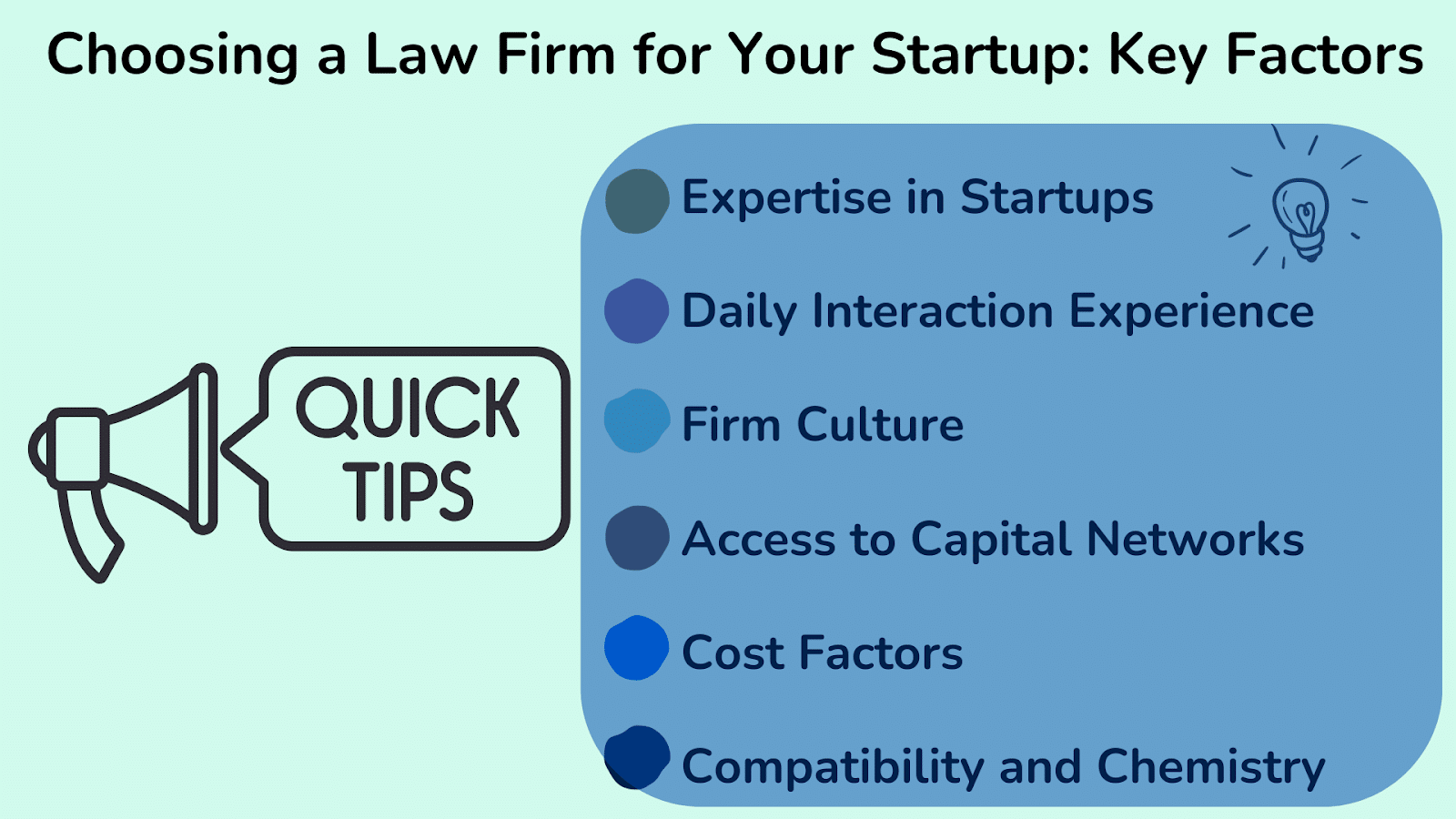Launching a startup is an exhilarating roller coaster ride, but one that requires a solid legal foundation to succeed. Without the right legal framework, your brilliant idea could crumble under the weight of avoidable pitfalls.
Seeking advice from a seasoned business lawyer specializing in startup law can serve as your guiding star, illuminating the path and safeguarding your dreams from potential turbulence. This comprehensive guide, packed with insights from legal experts, serves as your startup’s North Star for navigating small business law and regulations.
Choosing the Right Jurisdiction: A Strategic Cornerstone.
The choice of jurisdiction for incorporating your startup is not just a formality – it’s a strategic decision that can make or break your venture. A study highlights how aligning your core market, investor locations, and team base with the right jurisdiction impacts investor relations, customer trust, and operational efficiency.
Selecting a jurisdiction requires meticulous consideration of factors like corporate perception, legal frameworks, and tax implications. Each factor intertwines, either strengthening or weakening your market position.
If you’re starting a small business in Texas but don’t reside there, understanding the legal landscape can be daunting. This is where seeking guidance from a business lawyer well-versed in the laws and regulations of specific areas like Lubbock or Midland becomes invaluable.
For instance, consulting a business law expert in Midland, TX can provide insights into the unique legal frameworks and corporate perceptions that could impact your startup’s operations in that region. Similarly, a business attorney Lubbock, TX can help you navigate the local corporate regulations, tax structures, and other legal nuances specific to that jurisdiction.
The choice of jurisdiction is not just about paperwork – it’s about aligning your startup’s identity with the right legal and economic environment. A local business lawyer’s expertise can help you make an informed decision, ensuring you select a jurisdiction that strengthens your market position, fostering investor confidence, customer trust, and operational efficiency from the outset.

Navigating the VC Financing Labyrinth
Securing venture capital (VC) funding is often a marathon, not a sprint. Having a clear business strategy and consistently meeting milestones is paramount when wooing investors.
However, the true challenge lies in negotiating the complex dance of term sheet negotiations. A seasoned business lawyer’s expertise is invaluable in navigating potential pitfalls and unfavorable terms that could affect your startup’s future growth and control.
Retaining control during VC rounds is a delicate balance. Your lawyer can guide you through strategies for maintaining the reins, such as negotiating board control and drag-along rights.
Intellectual Property Rights for Small Businesses
Establishing the Foundation: Overview of Intellectual Property (IP)
Intellectual property (IP) encompasses a diverse range of rights that protect the fruits of human ingenuity and creativity. For small businesses, understanding the various types of IP is crucial for safeguarding their competitive edge and fostering sustainable growth.
Patents shield groundbreaking inventions and technological advancements, while trademarks protect the unique identities that distinguish businesses in a crowded market. Copyrights secure original literary, artistic, and software creations, and trade secrets shield valuable proprietary information from prying eyes.
Building the Fortress: Strategies for Protecting Intellectual Property
Merely acknowledging the importance of IP rights is insufficient; proactive measures are necessary to fortify your small business’s defenses. Conducting thorough IP audits to identify and document your valuable assets is the first step in this fortification process.
Drafting robust confidentiality agreements and implementing strict non-disclosure policies can prevent the accidental leakage of trade secrets. Additionally, pursuing necessary registrations, such as patents, trademarks, and copyrights, can solidify your exclusive rights and deter potential infringers.
By implementing these strategic IP protection measures, guided by the expertise of seasoned legal professionals, your small business can effectively safeguard its innovative edge and distinctive branding, ensuring that your entrepreneurial vision remains shielded from potential threats.
Legal Compliance for Small Businesses
Navigating the Regulatory Landscape: Ensuring Regulatory Compliance
The small business landscape is a labyrinth of legal regulations, spanning licensing requirements, permits, zoning laws, and industry-specific rules. Failure to navigate this intricate maze can result in costly fines, operational disruptions, and reputational damage – consequences that can cripple a fledgling small business.
By partnering with experienced legal professionals, you can demystify the complex web of regulations, ensuring that your small business remains compliant and poised for success.
Protecting Your Most Valuable Asset: Navigating Small Business Employment Laws
As your small business grows, your team becomes your most valuable asset, and ensuring compliance with employment laws is paramount. From hiring practices and employee contracts to wage laws, discrimination policies, and harassment prevention, the realm of employment law is vast and ever-evolving.
Proactive measures, such as implementing robust employee handbooks and training programs, can foster a positive workplace culture while mitigating legal risks.
By prioritizing legal compliance from the outset, you not only safeguard your small business from potential legal entanglements but also cultivate a reputation for ethical and responsible business practices – a hallmark of success in today’s increasingly conscious market.
The Contractual Cornerstone
While ideas are your startup’s lifeblood, contracts and policies form the armor protecting that lifeblood. Ensuring all agreements are properly documented in writing provides critical legal clarity and protection for your company.
Moreover, your IP and trade secrets demand unwavering legal safeguarding. An expert-guided IP strategy should define ownership, prevent misuse of others’ IP, and explore patent, trademark, and other protections under the law.
Trademark Registration for Small Businesses
Securing Your Brand Identity: Importance of Trademark Registration
In the world of business, a strong brand identity is an invaluable asset that distinguishes you from competitors and fosters customer loyalty. However, without the legal protection afforded by trademark registration, your brand’s uniqueness can be infringed upon, leading to costly legal battles and potential loss of market share. By securing a registered trademark, you gain exclusive rights to use your brand’s distinctive elements, deterring potential infringers and strengthening your legal standing in the event of disputes.
Navigating the Application Process: Trademark Search and Application Process
While the importance of trademark registration is clear, the process itself can be daunting for small business owners navigating the legal landscape for the first time. Conducting comprehensive trademark searches to ensure the availability of your desired mark is the crucial first step.
Once availability is confirmed, the application process involves meticulously preparing and submitting the necessary documentation to the appropriate authorities. Partnering with experienced legal professionals can streamline this intricate process, ensuring that your application is properly prepared and increasing the likelihood of successful registration.
With a registered trademark in hand, you can confidently safeguard your brand’s identity, fortifying your small business’s competitive advantage and positioning it for enduring success.
Expert Legal Guidance for Startup Success
In the ever-evolving entrepreneurial landscape, a seasoned business lawyer guides your startup through the treacherous legal terrain. From incorporation to IP, employment law, and brand protection, their expertise differentiates a stumble from soaring success.
Take the first step towards a robust legal foundation by contacting startup legal experts well-versed in business law. Your entrepreneurial vision deserves the solidity of a legally constructed structure – and experienced lawyers are here to make that reality with comprehensive guidance.
Published By: Aize Perez






